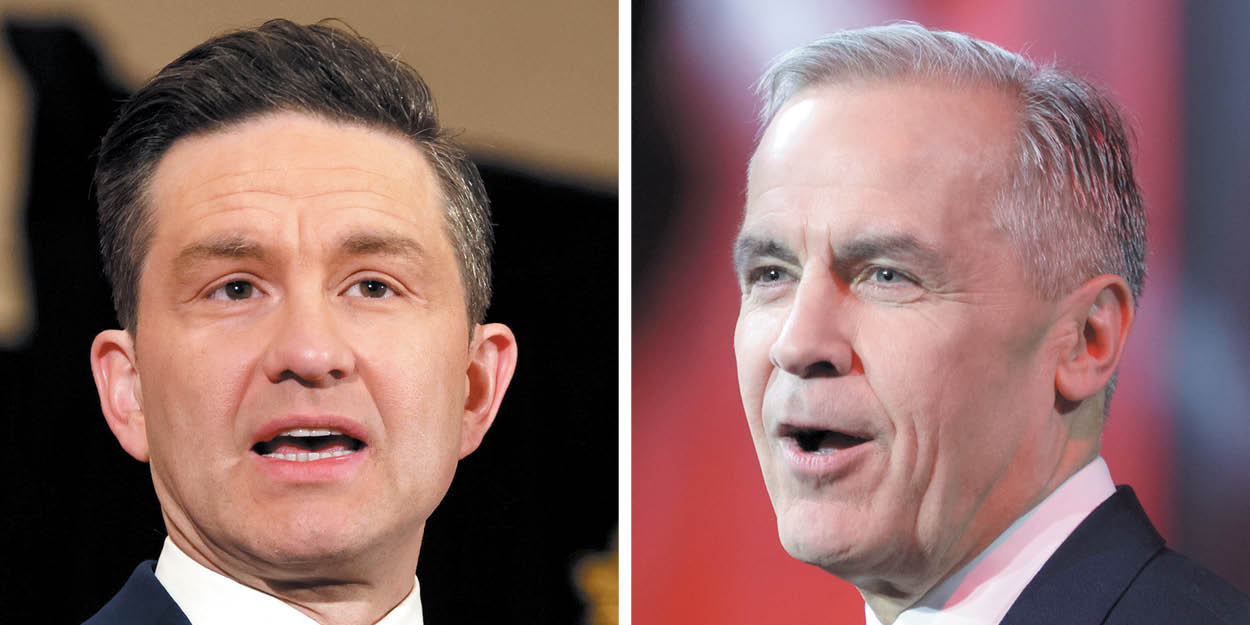Can Poilievre capitalize on Carney’s weak spots?

OTTAWA—Having been sworn-in as prime minister, Mark Carney appears ready to bring the fight to Conservative Leader Pierre Poilievre. If he mobilizes a good ground game, Carney could be on track to win the next federal election. The question is: can Poilievre stop him?
At first glance, Poilievre’s chances appears be fading. His 20-point lead has dwindled against Carney’s momentum. His likeability seems stuck at zero to Carney’s net positive ratings. Worse, an Angus Reid poll of March 5—after U.S. President Donald Trump’s 25-per-cent tariff on Canadian goods—had Carney leading Poilievre 43 to 34 per cent as the best suited to face Trump.
When the odds are stacked like that, some war rooms double down on a faltering strategy. Rationality takes a back seat to fear and delusion. Instead of brutally honest evaluations, the architects of the battle plan often spiral into defensive justifications, blaming the media or the messaging, rather than reassessing the tactical weaponry being used. This is typical of inside-out approaches that construct a plan and then mobilize like-minded militants around it.
Poilievre’s team should adopt an outside-in approach that takes stock of Carney’s strengths, why he is clicking with Canadians, and then adjust Poilievre’s style and strategy accordingly.
Carney may have an enviable CV, but there are cracks in the foundation. Aside from economics, his views to manage the debt and deficit, income inequality, foreign affairs, and poverty are either vague generalities, or reminiscent of Trudeau-era policies. Poilievre should not let Carney learn on the job. He should present clear, evidence-based alternatives, and frame Carney as “untested” to handle the fallout and aftermath of Trump’s unending attacks.
While Carney’s idea to employ crisis management to deal with Trump is theoretically sound, it lacks the specificity to fight back and win. This gap is another opportunity for Poilievre. He can turn theory into action with a detailed roadmap responding to Trump’s trade war trickery. A series of thought-through measures could help reassure Canadian workers and businesses, and inspire confidence in the explicit actions needed to push Trump back.
To do that convincingly, Poilievre must distance himself from Trump, noticeably in rhetoric and in behaviour. “Canada First,” sounds too much like “America First,” and Poilievre’s Trump inspired populist obsessions with the “woke” agenda, transgenders, tax cuts, the CBC and so on, sound like second-rate copies of Trump’s State of the Union address.
The next election will likely be all about Trump. Canadians don’t like him. A Polara poll also released on March 5 found that even Conservatives who held positive views of Trump fell from 44 to 29 per cent in the last month. Yet, 41 per cent of all Canadians believe Poilievre would “do what Trump demands,” versus 44 per cent who think Carney will “strongly oppose” him.
Poilievre should get real about Trump. The U.S. president has no interest in seeing Poilievre win. A “mini-me” in Ottawa undermines the political narrative that Trump needs to bolster his illiberal, proto-fascist base by continuously bashing Canada. Carney, on the other hand, is the perfect foil—a Liberal “globalist” to be fed as raw meat to Trump’s domestic supporters for the next four years.
As the Trump battle intensifies, Poilievre should expand the fight by targeting Carney on social safety-net issues. With a career rooted in global finance and corporate management, Carney has no viable record on addressing the real concerns of working families. Poilievre can create a stark contrast and gain support from neglected constituencies by positioning himself as the voice for frontline workers, single parents, unemployed youth, and other vulnerable Canadians.
This means Poilievre must abandon his penchant for dogmatic negativity, and run a positive campaign. Negative campaigns thrive only in times of internal anxieties like unemployment or inflation. External threats like Trump require unity and pragmatic solutions, all executed with finesse and statesmanship. Poilievre needs to emphasize the urgency of national cohesion and foster a hopeful, reflective discourse that resonates with a broad range of voters.
The last such reflection was in the 1960s with a Royal Commission that gave us our defining identity as a bilingual, multicultural nation. It integrated us as a caring and inclusive society. But much has changed since—deepening regional divides, foreign interference, and multipolarity in world affairs. Plus, the multicultural project has arguably been mostly realized.
Countering Carney with blowhard bluster, “Sneaky Carney” TV ads, and going on about the carbon tax will not work against Carney’s intellectual breadth. He is a formidable foe who now has full backing of the seasoned Liberal election-readiness machinery.
To put up a good fight, Poilievre should try new tactics, confronting Trump with a menu of sensible policies, solidarity, and social welfare. If not, Carney is gaining ground and he’s not swayed by smartass slogans—and neither are an increasing number of Canadians.
Bhagwant Sandhu is a retired director general from the federal public service. He has also held executive positions with the governments of Ontario and British Columbia.
The Hill Times






 LICENSING
LICENSING PODCAST
PODCAST ALERTS
ALERTS


